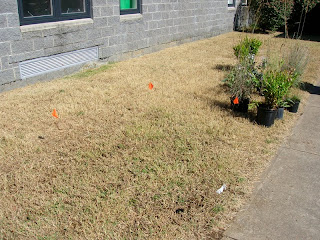
So, two Sundays ago, a few of us spent time planting a rain garden. Have you ever heard of a rain garden? I hadn't. Apparently, after the floods this past spring, the city of Nashville incurred some fines for the water table levels. In other words, as the water rose, the sewer water had mixed with the city water...and well, you can guess the rest.
The good news is that the money from the fines was used to plug back into making Nashville a greener city. One of the places the money went to was an organization that has the goal of planting 200 rain gardens at elementary schools during this 2010-2011 school year. We were one of the schools to participate.
Some interesting facts about rain gardens:
1. Their main function is to return water to the water table.
2. Since water is intended to go into the ground, not storm drains, water is redirected from those drains into the gardens. Rain gardens help prevent the overflowing of sewers, which ultimately keeps our human waste out of our streams.
3. The water is absorbed into the garden, helping the native plants grow tall and strong.
1. Their main function is to return water to the water table.
2. Since water is intended to go into the ground, not storm drains, water is redirected from those drains into the gardens. Rain gardens help prevent the overflowing of sewers, which ultimately keeps our human waste out of our streams.
3. The water is absorbed into the garden, helping the native plants grow tall and strong.
 Before
Before Working by hand to turn up the soil.
Working by hand to turn up the soil. Planting
Planting Watering
WateringAlthough our rain garden is a welcome addition to the school courtyard, it does seem, well, a bit small in comparison the larger city problem. But add this one to many others around the city and the effect is greater and greater.

There's something about getting your hands dirty and working with the ground. There's something about knowing that you are making a difference for the community you live in. The sun was hot that day, we only had one shovel, and with the absence of a hose we had to transport water in a large garbage canister. But our job was a success. I feel way more appreciative knowing that I got to be a part of the process. Thanks to our landscaper I am now way more aware of how plants can be used to make our growing, changing, developing world a better place.
Did you know that a lot of plants that are planted around parking lots have a purpose? Their leaves soak up the oils from the ground and as the sun shines on them the oil is broken down in a natural way. I was amazed by that one fact alone...and there were many more passed around that day.
Also, I learned something interesting about transplanting plants. When you take them out of the pots they are transported in, you have to break up their roots. If you do not break them up, they will continue to grow in a circular pattern like they did in the pot. This will cause the plant to become unhealthy and eventually die...it won't be able to take root in the new ground. The landscaper made a point of saying how mean it sounds to break up the roots, but ultimately it was for their good. It made a point to me as well....I have very often felt that my roots were being broken up...but in the end it turned out for my best. There are lessons everywhere to be learned.
For since the creation of the world God's invisible qualities
—his eternal power and divine nature—
have been clearly seen, being understood from what has been made,
so that men are without excuse.
Romans 1:20
—his eternal power and divine nature—
have been clearly seen, being understood from what has been made,
so that men are without excuse.
Romans 1:20
No comments:
Post a Comment